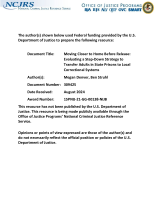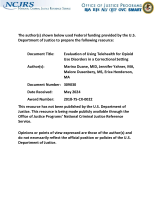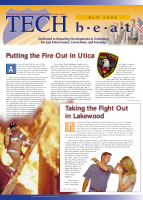Sheriffs
ABE: Evaluating LTL Technology
Contraband and Interdiction Strategies in Correctional Facilities
Deploying Body-worn Cameras in a Jail Setting: Impacts and Lessons Learned
Moving Closer to Home Before Release: Evaluating a Step-Down Strategy to Transfer Adults in State Prisons to Local Correctional Systems
Evaluation of Using Telehealth for Opioid Use Disorders in a Correctional Setting
The Effects of Police Contracting on Crime: An Examination of Compton, California
Just Science Podcast: Just Collecting More Evidence from Cartridge Cases
A Randomized Controlled Trial of the HeartMath Resilience Program: Exploring the Impact of Stress on Jail Staff Performance and Retention
What Works to Reduce Violent Gun Crime in Focused Deterrence Initiatives? Estimating the Effect of Services and Enforcement in Facilitating Desistence Among Prolific Violent Offenders
De-escalation Training: What Works, Implementation Lessons, and Taking It to Scale; Plenary at the 2023 NIJ Research Conference
Police use of force, while infrequently used, is a tremendous concern to public safety in the United States when officers employ it excessively or inappropriately, causing injury or death and eroding public trust in law enforcement. This plenary from the 2023 NIJ Research Conference describes the Integrating, Communications, Assessment, and Tactics (ICAT) de-escalation training program developed by the Police Executive Research Forum to guide officers in defusing critical incidents.
See the YouTube Terms of Service and Google Privacy Policy
Meeting People Where They Are to Improve Institutional Culture
Incarcerated individuals deserve opportunities for healing and growth, but they often lack the necessary resources for such opportunities. Additionally, organizational cultures that don’t support these outcomes often stand in the way. Researchers and practitioners gathered at NIJ’s 2023 National Research Conference to share ideas and projects that will increase opportunities for incarcerated populations around the country. This show continues their conversation.









